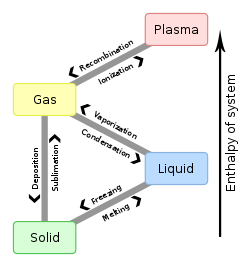Studies of the effect in water
Modern studies using freezers with well-understood properties have observed the Mpemba effect where water supercools before freezing. Water that starts out cooler tends to reach a lower supercooled temperature before freezing. Some studies measure the time it takes for a sample to begin to freeze (the start of recalescence, the moment where the heat of freezing first starts to be released) the time it takes to completely freeze, or the difference: the time from the onset of recalescence to the completion of freezing. Some also measure the time it takes for a sample to reach the freezing point of the fluid, before any freezing has begun.
In 1995, David Auerbach studied glass beakers placed into a liquid cooling bath, where the water supercooled to −6 to −18 °C (21 to 0 °F; 267 to 255 K) before freezing. In some cases water which started off hotter began freezing first. [20] Considerable random variation was observed in the time required for spontaneous freezing to start, and Auerbach observed the Mpemba effect more frequently when the ambient temperature was between −6 and −12 °C (21 and 10 °F). James Brownridge later studied a variety of initial conditions and containers, measuring the time to the onset of recalescence, and found that while hot samples sometimes froze first this was also affected by properties of the container holding the liquid. [21]
Writing for New Scientist , Mick O'Hare recommended starting the experiment with containers at 35 and 5 °C (95 and 41 °F; 308 and 278 K), respectively, to maximize the effect. [22]
In 2021, John Bechhoefer described a way to reliably reproduce the effect. [23] In 2024, Argelia Ortega, et al. studied the freezing of small (1 to 20 mL or 0.03 to 0.7 US fl oz) drops in a Peltier cell with a thermographic camera, and found that hot drops consistently froze faster than cold ones, with a more pronounced difference for larger drops. In particular, hot drops finished freezing sooner after the onset of recalescence, and experienced less of a temperature spike during the freezing process. [24]
Criticisms of experiments with water
Some researchers have criticized studies of the Mpemba effect for not accounting for dissolved solids and gases, and other confounding factors. [11] Even among experiments that agree on a definition and observe the Mpemba effect for some experimental setups, they often do not observe it for all setups and starting conditions. [12]
In 2006, Philip Ball, a reviewer for Physics World wrote: "Even if the Mpemba effect is real — if hot water can sometimes freeze more quickly than cold — it is not clear whether the explanation would be trivial or illuminating." [12] Ball wrote that investigations of the phenomenon need to control a large number of initial parameters (including type and initial temperature of the water, dissolved gas and other impurities, and size, shape and material of the container, the method of cooling, and the temperature of the refrigerator) and the need to settle on a particular method of establishing the time of freezing. Ball described simple ways in which the effect might be observed, such as if a warmer temperature melts the frost on a cooling surface, thereby increasing thermal conductivity between the cooling surface and the water container. [12]
In 2016, Burridge and Linden studied a slightly different measure, the time it took water samples to reach 0 °C but not freeze. They carried out their own experiments, and reviewed previous work by others. Their review noted that the large effects observed in early experiments had not been replicated in other studies of cooling to the freezing point, and that studies showing small effects could be influenced by variations in the positioning of thermometers: "We conclude, somewhat sadly, that there is no evidence to support meaningful observations of the Mpemba effect." [25]
Studies of the effect in colloids and other systems
Classical systems
The original classroom observations of the Mpemba effect were of fresh ice cream, a colloid, freezing in a freezer.
A generalized version of the Mpemba effect is "when a hotter system equilibrates faster than a colder one when both are quenched to the same low temperature." This has been modeled theoretically for simple systems such as single particles under Brownian motion. [14]
The possibility of a "strong Mpemba effect" where exponentially faster cooling can occur in a system at particular initial temperatures was predicted in 2019 by Klich, Raz, Hirschberg and Vucelja. If they existed, the effect in such systems would be easy to observe experimentally. [26] In 2020 the strong Mpemba effect was demonstrated experimentally by Avinash Kumar and John Boechhoefer in a single-particle colloidal system. [3] In 2022, that group also demonstrated an "inverse Mpemba effect" in a single-particle colloid where a cold system heats up much faster than a warmer one, under the right conditions. [27]
Quantum systems
Since 2020, quantum researchers have studied Mpemba effects in quantum systems as an example of how initial conditions of a system affects its thermal evolution. In 2024, a team in John Goold's lab at Trinity College described their quantum-mechanical analysis of an abstract problem wherein "an initially hot system is quenched into a cold bath and reaches equilibrium faster than an initially cooler system." [9] They included computational studies of spin systems which exhibit the effect, [9] concluding that certain initial conditions of a quantum system can lead to a simultaneous increase in the thermalization rate and the free energy. [10]
In 2025, experimental observations by Zhang, et al. found a quantum strong Mpemba effect for a single trapped ion, [28] and Chatterjee, et al. found the Mpemba effect occurs naturally during the cooling of nuclear spin states. [29]
